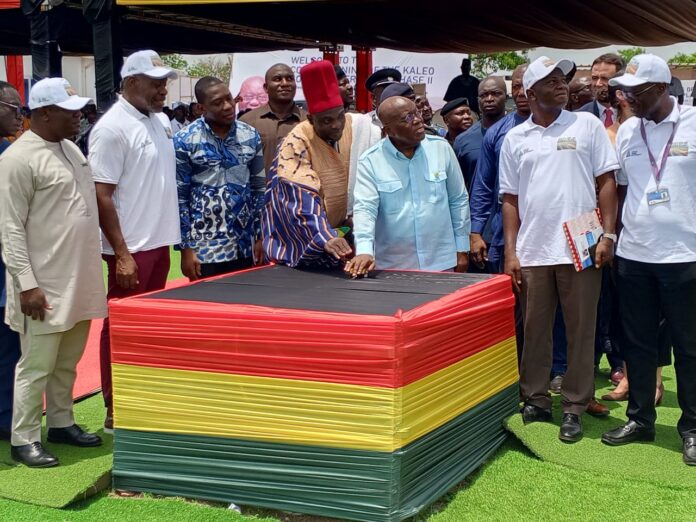President Nana Addo Dankwa Akufo-Addo has commissioned the second phase of the Kaleo Solar Power plant to augment electricity generation and supply.
The 15MW phase two project brings the total capacity of the Kaleo Solar Power plant to 28MW after the President commissioned about 13MW in phase one about two years ago.
Elecnor S.A. from Spain executed the project at an estimated cost of about 16 million Euros with consultancy services from Tractebel Engineering from Germany.
Speaking at the commissioning of the project at Kaleo on Wednesday, President Akufo-Addo indicated that the plant represented the country’s fundamental shift towards sustainable development and for enhancing electricity provision.
“Renewable energy sources such as solar power not only reduce our reliance on fossil fuel but also help mitigate adverse effects of climate change. By investing in renewable energy infrastructure, we’re securing a reliable source of electricity.
It is part of government’s roadmap of positioning the country as a regional leader in clean and sustainable energy by leveraging vast natural resources,” he said.
President Akufo-Addo indicated that the vision of the country was not only to be energy self-sufficient, but also to set the stage for Ghana to emerge as an eco-friendly country and to inspire neighbouring countries to pursue a more energy technology-centred future.
He stated that the Solar Power Project at Kaleo would help create new opportunities for economic growth and job creation in the area, empower homes and businesses, and serve as a catalyst for development in the region by attracting investment and spurring innovation.
“The government is implementing a series of policies and measures to incentivise green investments, foster a culture of energy efficiency, prioritise the development of solar, wind and hydroelectric power projects as key strategies for the growth of the energy sector in the country,” the President said.
President Akufo-Addo said the project would also promote practical studies in the development of solar power by the technical universities in the northern part of the country.
He appreciated the German government for providing the funding for the construction of the facility and the EU for its assistance in the development of the project and its contribution to the general development of Ghana.
President Akufo-Addo commended the contractor and the consultant for delivering the project on schedule.
He urged stakeholders to adopt the right maintenance management regime to enable the plant to serve its expected purpose.
Mr Herbert Krapa, a Deputy Minister-designate for the Ministry of Energy, said the Solar Power project was an indication that the VRA had risen to the occasion in answering the call for producing greener, cleaner sources of power for the country.
He said government was putting in place measures to ensure the country’s thermal plants and power-producing plants run at full capacity and realigning the operational and technical arrangements in the entire power sector of the country.
Mr Krapa, who is also the Board Chairman of the Electricity Company of Ghana (ECG), assured Ghanaians that “In the next few days the power challenges that we are seeing under the leadership of His Excellency the President will be a thing of the past.”
Mr Irchad Razaaly, the European Union (EU) Ambassador to Ghana, said the EU prioritised investment in the country that would contribute meaningfully to the country’s economic growth by investing in areas that could lead to a lasting positive transformation.
He observed that countries over the world were increasingly moving towards sustainable practices and Ghana had positioned itself as a leader in Africa.
Mr Razaaly explained that the project created more than a hundred jobs for the people in the community during the construction period and thanked all persons and institutions that played diverse roles in making it a success.
Madam Ramona Simon, the Acting Head of Cooperation at the German Embassy in Ghana, stated that the project would provide about 50,000 households with low-cost electricity and help reduce 20,000 tons of carbon dioxide emission annually.
She explained that embracing renewable energy would not only save the environment for future generations but also pave the way for economic empowerment and enhanced energy security, especially in northern Ghana.
Kuoro Osman Diewia Nankpa III, the Paramount Chief of the Pulima Traditional Area in the SIssala West District, who chaired the function, appealed to the government to ensure that the frequent power outages experienced in the region became a thing of the past.
Mr Kofi Tutu Agyare, the Board Chairman of the Volta River Authority (VRA), indicated that the solar project was in line with the country’s Renewable Energy Development programme.
While thanking the German Federal Government for supporting the country over the years, he expressed hope that the VRA and the German government would continue to work together for long-term mutual benefit.
He also assured the people of Kaleo that the VRA would continue to support the community’s development through its corporate social responsibility interventions.
The German government provided the funding through the German Development Bank (KfW) to support Ghana in executing the project.
Ghana provided counterpart funding of 8.2 million Euros through the VRA.

